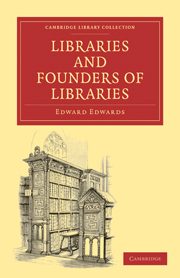Book contents
- Frontmatter
- PREFACE
- Contents
- LIBRARIES, AND THE FOUNDERS OF LIBRARIES
- CHAPTER I INTRODUCTORY.—THE ANCIENT LIBRARIES OF EGYPT, OF JUDÆA, OF GREECE, AND OF THE ROMAN EMPIRE
- CHAPTER II INTRODUCTORY. — MEDIÆVAL AND MODERN LIBRARIES. — ANTICIPATORY SURVEY OF THE SUBJECT, IN GENERAL
- CHAPTER III OF SOME LIBRARIES OF MONASTERIES ABROAD
- CHAPTER IV OF SOME LIBRARIES OF MONASTERIES AT HOME
- CHAPTER V CONCERNING THE LIBRARIES OF SOME FAMOUS AUTHORS, OF VARIOUS PERIODS
- CHAPTER VI CONCERNING THE LIBRARIES OF SOME CELEBRATED MONARCHS AND ROYAL PERSONAGES, OF VARIOUS PERIODS
- CHAPTER VII HISTORY OF THE OLD ROYAL LIBRARY OF THE KINGS OF ENGLAND
- CHAPTER VIII HISTORY OF THE STATE PAPER OFFICE
- CHAPTER IX HISTORY OF THE PUBLIC RECORDS OF THE REALM, IN THEIR EARLY PERIOD OF GROWTH AND SEPARATE CUSTODY
- CHAPTER X THE LIFE OF THOMAS PARKER, EARL OF MACCLESFIELD.—THE LIFE OF NICHOLAS JOSEPH FOUCAULT.—HISTORY AND DESCRIPTION OF THE LIBRARY AT SHIRBURN CASTLE IN OXFORDSHIRE
- CHAPTER XI THE LIFE OF CHARLES SPENCER, THIRD EARL OF SUNDERLAND. — HISTORY AND DESCRIPTION OF THE LIBRARY AT BLENHEIM PALACE
- CHAPTER XII THE PUBLIC LIFE OF GEORGE JOHN, SECOND EARL SPENCER.—HISTORY AND DESCRIPTION OF THE SPENCER LIBRARY AT ALTHORP
- APPENDIX A LIST AND DESCRIPTION OF EXTANT CATALOGUES OF ENGLISH MONASTIC LIBRARIES, DISTINGUISHING THE UNPRINTED FROM THE PRINTED
- APPENDIX B NOTE ON THE LIBRARY OF KING EDWARD THE SIXTH
- APPENDIX C SUMMARY CLASSIFICATION AND SYNOPTICAL VIEW OF THE PUBLIC RECORDS OF THE REALM
- Plate section
CHAPTER X - THE LIFE OF THOMAS PARKER, EARL OF MACCLESFIELD.—THE LIFE OF NICHOLAS JOSEPH FOUCAULT.—HISTORY AND DESCRIPTION OF THE LIBRARY AT SHIRBURN CASTLE IN OXFORDSHIRE
Published online by Cambridge University Press: 10 November 2010
- Frontmatter
- PREFACE
- Contents
- LIBRARIES, AND THE FOUNDERS OF LIBRARIES
- CHAPTER I INTRODUCTORY.—THE ANCIENT LIBRARIES OF EGYPT, OF JUDÆA, OF GREECE, AND OF THE ROMAN EMPIRE
- CHAPTER II INTRODUCTORY. — MEDIÆVAL AND MODERN LIBRARIES. — ANTICIPATORY SURVEY OF THE SUBJECT, IN GENERAL
- CHAPTER III OF SOME LIBRARIES OF MONASTERIES ABROAD
- CHAPTER IV OF SOME LIBRARIES OF MONASTERIES AT HOME
- CHAPTER V CONCERNING THE LIBRARIES OF SOME FAMOUS AUTHORS, OF VARIOUS PERIODS
- CHAPTER VI CONCERNING THE LIBRARIES OF SOME CELEBRATED MONARCHS AND ROYAL PERSONAGES, OF VARIOUS PERIODS
- CHAPTER VII HISTORY OF THE OLD ROYAL LIBRARY OF THE KINGS OF ENGLAND
- CHAPTER VIII HISTORY OF THE STATE PAPER OFFICE
- CHAPTER IX HISTORY OF THE PUBLIC RECORDS OF THE REALM, IN THEIR EARLY PERIOD OF GROWTH AND SEPARATE CUSTODY
- CHAPTER X THE LIFE OF THOMAS PARKER, EARL OF MACCLESFIELD.—THE LIFE OF NICHOLAS JOSEPH FOUCAULT.—HISTORY AND DESCRIPTION OF THE LIBRARY AT SHIRBURN CASTLE IN OXFORDSHIRE
- CHAPTER XI THE LIFE OF CHARLES SPENCER, THIRD EARL OF SUNDERLAND. — HISTORY AND DESCRIPTION OF THE LIBRARY AT BLENHEIM PALACE
- CHAPTER XII THE PUBLIC LIFE OF GEORGE JOHN, SECOND EARL SPENCER.—HISTORY AND DESCRIPTION OF THE SPENCER LIBRARY AT ALTHORP
- APPENDIX A LIST AND DESCRIPTION OF EXTANT CATALOGUES OF ENGLISH MONASTIC LIBRARIES, DISTINGUISHING THE UNPRINTED FROM THE PRINTED
- APPENDIX B NOTE ON THE LIBRARY OF KING EDWARD THE SIXTH
- APPENDIX C SUMMARY CLASSIFICATION AND SYNOPTICAL VIEW OF THE PUBLIC RECORDS OF THE REALM
- Plate section
Summary
Thou art not, [Shirburn,] built to envious show
Of touch, or marble ; nor canst boast a row
Of polish'd pillars, or a roof of gold;
Thou hast no lanthorn, whereof tales are told;
Or stair; or courts; but stand'st an ancient pile,
And, those grudg'd at, art reverenc'd the while.
Thou joy'st in better marks,—of soil, of air,
Of wood, of water,—wherein thou art fair.
Thou hast thy walks for health, as well as sport;
Thy Hill, to which the Dryads did resort,
Where Pan and Bacchus their high feasts have made,
Beneath the broad beech, and the chestnut shade,
Ben Jonson.As the traveller crosses the wooded ridge of the Chilterns, and descends into the vale of Oxford,—whether from Stokenchurch or from the little hamlet of Greenfield,—Shirburn lies almost immediately beneath him. The now thickly sheltered house is one of the few castellated and still moated buildings, in England, which have been adapted to the requirements of modern comfort, without any—or with scarcely any—sacrifice of external congruity. Castellated in 1377, when part of the existing structure was already a building of respectable antiquity, it passed successively, and by many vicissitudes, through the families of De Lisle, Beauchamp, Talbot, Quatremaine, Fowler, Chamberlayne, and Gage, until it was purchased by the Lord Chancellor Macclesfield from Thomas, Viscount Gage, at the beginning of the last century.
- Type
- Chapter
- Information
- Libraries and Founders of Libraries , pp. 327 - 367Publisher: Cambridge University PressPrint publication year: 2010First published in: 1864



